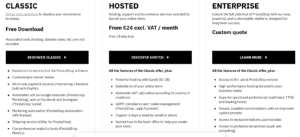I recommend PrestaShop hosting for medium-sized businesses and technically proficient store owners seeking a customizable e-commerce solution with no licensing fees. PrestaShop offers extensive customization options, a large community of developers, and complete control over your online store without recurring platform fees. However, the platform requires more technical knowledge than hosted solutions, has slower average page load speeds, and can incur unpredictable costs through premium modules and themes.
Overview and Evolution
PrestaShop has established itself as a popular open-source e-commerce platform since its launch in 2007. The software powers over 300,000 active online stores worldwide and maintains a strong presence in the self-hosted e-commerce market.
The platform continues to evolve with regular updates and community contributions that enhance its functionality and security. PrestaShop’s open-source nature allows for extensive customization and flexibility that many business owners appreciate.

Recent developments in 2025 have focused on improving performance issues that previously plagued the platform. The core design, while still somewhat data-centric, has received optimization updates to enhance loading speeds and overall user experience.
PrestaShop offers two deployment options for merchants: self-hosted PrestaShop, which requires separate hosting, and PrestaShop Cloud, a hosted solution with more limitations. Most experienced users prefer the self-hosted version for its greater flexibility and customization options.
The platform’s architecture supports a wide range of products, payment gateways, and shipping methods, making it suitable for various types of online stores. This versatility has contributed to its continued popularity despite increasing competition from hosted platforms.
Hosting Requirements and Considerations
PrestaShop requires specific hosting configurations to perform optimally as a web application. The platform’s resource needs increase with store size, product count, and visitor traffic.
Server requirements for PrestaShop include PHP 7.4 or higher, MySQL 5.6 or higher, and at least 256MB of memory allocation. These technical specifications must be met by any hosting provider you consider for your PrestaShop store.
Load handling capabilities represent a critical factor when selecting PrestaShop hosting. The platform needs sufficient server resources to serve pages to visitors without delays, especially during high-traffic periods.
Scalability emerges as another essential consideration for PrestaShop hosting. E-commerce stores typically experience traffic fluctuations during sales events like Black Friday or holiday seasons, requiring flexible resource allocation.
| Hosting Requirement | Minimum Specification | Recommended Specification |
|---|---|---|
| PHP Version | 7.4+ | 8.1+ |
| MySQL Version | 5.6+ | 8.0+ |
| Memory Allocation | 256MB | 512MB+ |
| Storage Type | SSD | NVMe SSD |
| Bandwidth | Unmetered | Unmetered |
| SSL Certificate | Required | Required |
The hosting environment significantly impacts PrestaShop’s performance, with specialized PrestaShop hosting solutions offering optimized server configurations. These optimizations include server-level caching, content delivery networks, and performance-tuned PHP settings.
Security considerations for PrestaShop hosting include regular backups, malware scanning, and firewall protection. These features help protect your store from data loss and unauthorized access attempts.
Top PrestaShop Hosting Providers in 2025
A2 Hosting stands out as the premier PrestaShop hosting provider in 2025, earning recognition as PrestaShop’s premium preferred host. The company offers four hosting plans with varying resources and performance levels to accommodate different store sizes.
A2’s Turbo plans feature AMD EPYC Servers coupled with NVMe drives that deliver 40% faster computing and can handle 9x more traffic. These high-performance options provide significant advantages for stores with higher traffic volumes or complex product catalogs.

IONOS Hosting provides another strong option for PrestaShop stores with its balance of performance and affordability. The company offers specialized e-commerce hosting packages that include PrestaShop-specific optimizations and security features.
Hostinger has emerged as a budget-friendly PrestaShop hosting solution in 2025, offering plans starting at just $2.78 per month. Despite the low price point, Hostinger delivers impressive performance metrics and includes features like free SSL certificates and weekly backups.
| Provider | Starting Price | Key Features | Best For |
|---|---|---|---|
| A2 Hosting | Higher | Turbo servers, NVMe storage, global data centers | Performance-focused stores |
| IONOS | Mid-range | Dedicated resources, managed security, European servers | European merchants |
| Hostinger | $2.78/month | Affordable, good performance, user-friendly | Budget-conscious merchants |
| HostPapa | $2.95/month | Unlimited storage on higher plans, free migration | Small to medium stores |
| Scala Hosting | Mid-range | Managed VPS recommended, NVMe SSD, 7-day backups | Growing stores needing scalability |
HostPapa offers three PrestaShop hosting plans (Starter, Business, and Business Pro) with varying resource allocations. The provider includes free domain registration and a website builder with all plans, though unlimited resources come with fair usage policies.
Scala Hosting recommends its managed VPS hosting for PrestaShop stores, providing enterprise-grade NVMe SSD drives and E5 multi-core CPUs on a 10 Gbps network. This configuration delivers the performance needed for larger PrestaShop implementations.
Performance and Reliability
PrestaShop’s performance depends heavily on the hosting environment and optimization efforts. The platform has historically faced criticism for slower page load speeds compared to some competitors.
Server response times vary significantly between hosting providers, with A2 Hosting’s Turbo plans delivering some of the fastest results in testing. These performance differences directly impact user experience and conversion rates for online stores.
Uptime reliability remains a critical factor for e-commerce sites where downtime directly translates to lost sales. Most specialized PrestaShop hosting providers offer uptime guarantees of 99.9% or higher, with actual performance often exceeding these promises.
Geographic performance considerations become important for stores serving international customers. Hosting providers with global data center networks or content delivery network (CDN) integration provide better experiences for worldwide audiences.
| Performance Metric | Average Result | Top Performer |
|---|---|---|
| Server Response Time | 300-600ms | A2 Hosting (140-200ms) |
| Page Load Time | 1.5-3 seconds | Hostinger (1.03 seconds) |
| Uptime | 99.9%+ | A2 Hosting (99.99%) |
| Mobile Performance | Variable | Depends on optimization |
| Global Performance | Varies by host location | A2 Hosting (global data centers) |
Mobile performance requires special attention with PrestaShop stores, as the platform doesn’t always deliver optimal mobile experiences without additional optimization. Responsive themes and performance tuning become essential for mobile shoppers.
Caching solutions play a significant role in PrestaShop performance optimization. Many specialized hosting providers include server-level caching and CDN integration to improve page load times and handle traffic spikes more effectively.
Features and Functionality
PrestaShop hosting providers offer various features designed to enhance the e-commerce experience. These features range from basic hosting necessities to specialized e-commerce tools.
One-click PrestaShop installation represents a standard feature across most hosting providers. This functionality simplifies the initial setup process, allowing merchants to launch their stores more quickly.

Free SSL certificates come included with most PrestaShop hosting plans, providing essential security for customer transactions. This inclusion saves merchants the expense of purchasing certificates separately.
Automated backup systems vary between providers, with some including daily or weekly backups in all plans while others offer them only in higher-tier packages or as paid add-ons. These backups provide crucial protection against data loss.
| Feature Category | Common Inclusions | Premium Additions |
|---|---|---|
| Security | Free SSL, basic firewall | Malware scanning, advanced firewall |
| Performance | SSD storage, basic caching | NVMe storage, advanced caching, CDN |
| Management | cPanel/control panel, one-click install | Staging environments, managed updates |
| Support | Knowledge base, ticket system | Priority support, PrestaShop specialists |
| E-commerce | Basic PrestaShop compatibility | Optimized server configuration, specialized support |
Content delivery network (CDN) integration helps improve global performance for PrestaShop stores. Many hosting providers include Cloudflare CDN or similar services to cache content closer to visitors worldwide.
Staging environments allow merchants to test changes before implementing them on live stores. This feature, available with some premium hosting plans, reduces the risk of disruptions when updating themes, modules, or the PrestaShop core.
Cost Considerations
PrestaShop hosting costs vary widely depending on the provider, plan level, and included features. Basic shared hosting plans start around $2.78-$3.95 per month, while high-performance options can exceed $30 monthly.
Initial promotional pricing often provides significant discounts for new customers, but renewal rates typically increase substantially. This pricing strategy is common across the hosting industry but requires consideration for long-term budgeting.
The total cost of running a PrestaShop store extends beyond just hosting expenses. Additional costs include domain registration (approximately $12.99/year), SSL certificates (if not included), and premium themes and modules.
Premium PrestaShop themes typically cost around $60-100 for a one-time purchase. These themes provide professional designs and often include additional functionality beyond the free options.
| Expense Category | Approximate Cost | Frequency |
|---|---|---|
| Basic Hosting | $2.78-$10/month | Monthly/Annually |
| Premium Hosting | $15-$50+/month | Monthly/Annually |
| Domain Name | $12.99/year | Annually |
| SSL Certificate | $0-$17.95/year | Annually (often included) |
| Premium Theme | $60-$100 | One-time |
| Premium Modules | $50-$300+ each | One-time or subscription |
Premium modules represent a significant potential expense for PrestaShop stores. Essential functionality often requires purchasing additional modules, with prices ranging from $50 to over $300 per module.
Support costs may also factor into the total expense, as PrestaShop itself doesn’t provide free support for the platform. Professional support plans from PrestaShop can be relatively expensive compared to the initial free software.
Security Considerations
PrestaShop security requires attention from store owners, as e-commerce sites represent attractive targets for attackers. The platform receives regular security updates, but implementation depends on the merchant or hosting provider.
Automated security updates vary between hosting providers, with managed PrestaShop hosting often including this valuable service. Regular updates help protect against known vulnerabilities that could compromise customer data.
Malware scanning and removal capabilities provide another layer of protection for PrestaShop stores. Some hosting providers include basic scanning, while others offer premium security services as add-ons.
PCI compliance becomes essential for stores accepting credit card payments directly. Hosting environments must meet specific security standards to maintain compliance, though many merchants use third-party payment processors to reduce this burden.
Backup frequency and retention policies differ significantly between hosting providers. Daily automated backups with extended retention periods provide the best protection against data loss from security incidents or technical failures.
Two-factor authentication and secure access controls help protect administrative accounts from unauthorized access. These security features vary by hosting provider and may require additional configuration.
PrestaShop vs. Competitors
PrestaShop competes with several other e-commerce platforms, each with distinct advantages and limitations. Understanding these differences helps merchants select the most appropriate solution for their needs.
WooCommerce offers a WordPress-based alternative that provides better integration with content-focused websites. The platform generally delivers superior blogging capabilities and a potentially gentler learning curve for WordPress users.
Opencart represents another open-source competitor with similar self-hosted requirements. The platform offers comparable features but with different interface design and extension ecosystems.
Shopify provides a fully-hosted alternative that eliminates technical maintenance requirements but introduces monthly subscription fees and transaction costs. The platform delivers better out-of-the-box performance but less flexibility than PrestaShop.
| Platform | Hosting Type | Initial Cost | Ongoing Costs | Customization Level |
|---|---|---|---|---|
| PrestaShop | Self-hosted | Free software | Hosting + modules | High |
| WooCommerce | Self-hosted | Free software | Hosting + plugins | High |
| Opencart | Self-hosted | Free software | Hosting + extensions | High |
| Shopify | Fully-hosted | Free trial | $29-$299/month + fees | Medium |
| BigCommerce | Fully-hosted | Free trial | $29-$299/month | Medium |
BigCommerce offers another hosted alternative with enterprise-level features and scalability. The platform eliminates technical maintenance like Shopify but comes with similar subscription costs and somewhat less flexibility than PrestaShop.
Magento (Adobe Commerce) targets larger enterprises with more complex requirements. The platform offers greater scalability and features but requires significantly more technical expertise and higher hosting costs than PrestaShop.
Pros and Cons of PrestaShop Hosting
Pros:
-
Complete ownership and control of your e-commerce store without platform-imposed limitations or restrictions.
-
No licensing fees or revenue sharing requirements, as PrestaShop is free, open-source software.
-
Extensive customization possibilities through the open-source codebase and large module marketplace.
-
One-time purchase model for most modules and themes, avoiding recurring subscription fees for extensions.
-
Strong multi-language and multi-currency support for international selling without additional costs.
-
Large community of developers and users providing resources, tutorials, and troubleshooting assistance.
-
Complete data ownership without dependency on a third-party platform that could change terms or cease operations.
-
Flexible hosting options ranging from affordable shared hosting to high-performance dedicated servers.
Cons:
-
Technical knowledge requirements exceed those of hosted platforms like Shopify or BigCommerce.
-
Performance optimization challenges can result in slower page loads without proper configuration.
-
Security maintenance responsibility falls on the store owner or hosting provider rather than a platform company.
-
Potentially high costs for premium modules that provide essential functionality for professional stores.
-
Limited free support options from PrestaShop itself, with official support plans being relatively expensive.
-
Fragmented administrative interface that can require navigating multiple screens to complete related tasks.
-
Ongoing maintenance requirements including regular updates, security patches, and performance tuning.
-
Variable hosting quality can significantly impact store performance, security, and reliability.
My Opinion
After analyzing PrestaShop hosting options and the platform itself in 2025, I believe PrestaShop remains a viable option for specific types of e-commerce businesses. The platform offers exceptional flexibility and customization potential without ongoing licensing fees, making it attractive for technically proficient merchants or those with development resources.
The self-hosted nature of PrestaShop provides complete control over your store’s environment, data, and functionality. This independence from platform-imposed limitations allows for unique store experiences that can differentiate your brand in competitive markets.
However, PrestaShop’s technical requirements and potentially fragmented workflow create higher barriers to entry than hosted alternatives. The platform demands more technical knowledge or budget for professional assistance, which smaller merchants may find challenging.

The total cost of ownership for PrestaShop stores can be unpredictable due to premium module requirements and potential development needs. While the software itself is free, building a fully-featured store often requires significant investment in extensions and customization.
For merchants with technical capabilities or development resources, PrestaShop offers excellent value and flexibility. The platform shines for mid-sized businesses with unique requirements that would be difficult or expensive to implement on hosted platforms.
Overall, PrestaShop hosting remains a strong option in 2025 for the right merchant profile, but requires careful consideration of technical requirements, total costs, and ongoing maintenance needs before committing.
FAQ
Q: What is PrestaShop hosting?
A: PrestaShop hosting is a specialized web hosting service optimized for the PrestaShop e-commerce platform. These hosting solutions include server configurations tailored to PrestaShop’s requirements, often featuring one-click installation, optimized server settings, and technical support familiar with PrestaShop-specific issues.
Q: How much does it cost to run a PrestaShop store?
A: The cost of running a PrestaShop store in 2025 includes several components. Basic expenses include hosting (approximately $2.78-$50+ per month depending on performance needs), domain registration ($12.99/year for .com domains), and SSL certificates ($0-$17.95/year, often included with hosting).
Q: Which hosting provider is best for PrestaShop in 2025?
A: A2 Hosting stands as the top PrestaShop hosting provider in 2025, recognized as PrestaShop’s premium preferred host. Their Turbo plans feature AMD EPYC Servers with NVMe drives, delivering 40% faster computing and handling 9x more traffic than standard hosting.
Q: Is PrestaShop better than Shopify for e-commerce?
A: PrestaShop and Shopify serve different merchant needs in 2025. PrestaShop offers complete ownership, no recurring platform fees, and unlimited customization, but requires technical knowledge and ongoing maintenance. Shopify provides an all-in-one solution with superior ease of use and built-in performance.
Q: What are the main challenges faced by PrestaShop store owners?
A: PrestaShop store owners face several key challenges in 2025. Performance issues remain a concern, with the platform requiring optimization to achieve competitive page load speeds. The technical nature of the platform necessitates more knowledge or professional assistance compared to hosted alternatives.
Q: Does PrestaShop provide hosting services?
A: PrestaShop offers two deployment options: self-hosted PrestaShop and PrestaShop Cloud. The self-hosted version requires purchasing separate hosting from providers like A2 Hosting, Hostinger, or IONOS. PrestaShop Cloud provides a hosted solution where PrestaShop manages the hosting infrastructure.
Q: What server requirements does PrestaShop have in 2025?
A: PrestaShop requires specific server configurations in 2025 to perform optimally. Minimum requirements include PHP 7.4 or higher (with 8.1+ recommended), MySQL 5.6 or higher (8.0+ recommended), and at least 256MB of memory allocation (512MB+ recommended).


